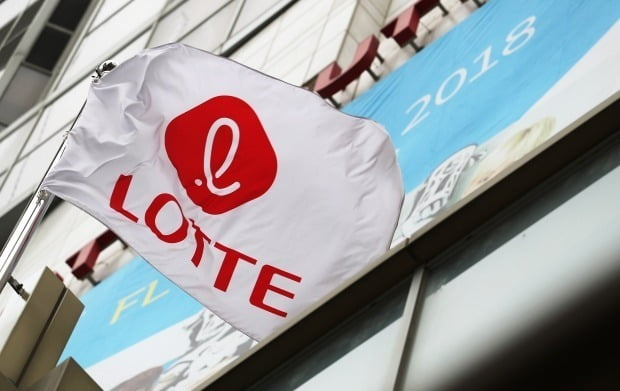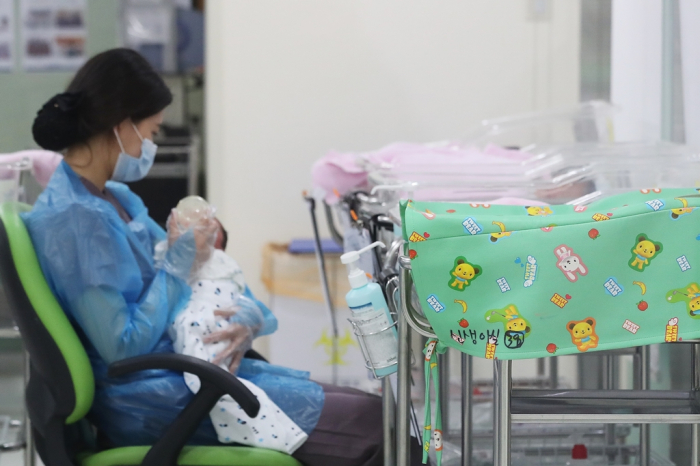Corporate strategy
Lotte leads corporate push to raise Korea’s dismal birthrate
Lotte’s childcare benefits stand out among big companies as Korea struggles with the world’s lowest birthrate
By Oct 16, 2023 (Gmt+09:00)
4
Min read
Most Read
LG Chem to sell water filter business to Glenwood PE for $692 million


KT&G eyes overseas M&A after rejecting activist fund's offer


Kyobo Life poised to buy Japan’s SBI Group-owned savings bank


StockX in merger talks with Naver’s online reseller Kream


Meritz backs half of ex-manager’s $210 mn hedge fund



South Korea’s dreadfully low birthrate — the world’s lowest — is not just a concern for politicians or government officials. It also poses a threat to business leaders, who fear a dwindling workforce will eventually weaken their companies’ competitiveness.
While big conglomerates such as Samsung, LG, Hyundai Motor and SK have made efforts to boost the country’s fertility rate by letting employees take generous maternity leave or offering incentives for those who give birth to a child, no other companies seem to have been more awakened to the harsh reality and taken action than Lotte.
In a first among big Korean companies, Lotte Group in 2012 introduced a one-year childcare leave system, which allows female employees to take a one-year leave that immediately follows the three-month government-mandated maternity leave.
The one-year childcare leave is mandatory at Lotte, meaning the relevant employee does not have to obtain supervisors' approval for it, according to the company.
In 2017, the one-year childcare leave evolved into a two-year program. Lotte also made it mandatory for male employees to take paternity leave for at least one month when their wives give birth.

Lotte said more than 8,000 male workers took paternity leave between 2017 and 2022.
Ministry of Employment and Labor data shows that over that same period, 5.5% of 146,000 male childcare leave-takers nationwide were Lotte employees.
Considering that many male employees are reluctant to take childcare leave for economic reasons, Lotte has fully guaranteed their regular wages for the first month of childcare leave. Lotte has also provided support for female employees’ leaves for fertility treatments and related medical expenses.
"Korea’s low birthrate is a significant long-term threat to the growth of businesses. Efforts to overcome the low birthrate have mostly been led by the government so far, but companies should also play their role to achieve maximum results,” said Jung Jae-hoon, a professor in the Department of Social Welfare at Seoul Women’s University.
DECADE-LONG EFFORTS BEAR FRUIT
Lotte Group said on Monday its “Lotte Birthrate,” or the number of babies born to every 100 Lotte employees, has remained above 2 since it adopted the one-year childcare program in 2012, and stood at 2.05 last year.

The figure stands in stark contrast with Korea’s overall birthrate.
The Lotte Birthrate is significantly higher than Korea's average birthrate in 2022 of 0.81 per 100 adults aged 20 to 60.
Statistics Korea, the country’s official statistics agency, said in August that Korea’s total fertility rate slid back to its historic trough of 0.7 in the second quarter, deepening the demographic time bomb looming over Asia’s fourth-biggest economy.
The second-quarter figure matched Korea’s previous historic low of 0.7, reached in the fourth quarter of last year.
Korea’s fertility rate has seen a rapid decline. Among OECD members, it is the only country with a total fertility rate below 1.0, a level it reached in 2018. The total fertility rate measures the average number of children a woman is expected to give birth to in her lifetime.

FURTHER STEPS TO BOOST BIRTHRATE
Lotte said it also provides a second one-year childcare leave program for its employees when their kids enter elementary school.
Any employee with a childcare need can use a flexible 8-hour work system if they can stick to the mandatory core work hours between 10 a.m. and 3 p.m.
“A couple without a child might not decide to have a baby just because of our company’s generous childcare benefits. But certainly, the system has merits for those who are considering having a second or a third child,” said Kim Jun-sung, a manager at Lotte Duty Free who has taken paternity leave three times for his three kids.

Industry officials said Lotte’s generous childcare system has also led to a higher number of female executives.
As of the end of last year, Lotte had 47 female executives, accounting for 7.1% of its workforce. This is higher than the average female executive ratio of 5.6% at Korea’s top 100 companies, according to Korean headhunting firm Unico Search.
Other major Korean companies have also been offering childcare benefits to their employees.
Samsung Electronics Co. said 1,310 of its male employees used paternity leave last year, exceeding the 1,000 mark for the first time.
Write to Hun-Hyoung Ha at hhh@hankyung.com
In-Soo Nam edited this article.
More to Read
-
 EconomyS.Korea’s birth rate at record low despite rebound in marriages
EconomyS.Korea’s birth rate at record low despite rebound in marriagesAug 30, 2023 (Gmt+09:00)
2 Min read -
 EconomyS.Korea mulls adding national pension benefits to raise birth rate
EconomyS.Korea mulls adding national pension benefits to raise birth rateMay 31, 2023 (Gmt+09:00)
1 Min read -
 EconomySeoul to lower bar for multi-child family subsidies to raise birth rate
EconomySeoul to lower bar for multi-child family subsidies to raise birth rateMay 16, 2023 (Gmt+09:00)
1 Min read -
 EconomyS.Korea’s birth rate decline accelerates to world’s lowest
EconomyS.Korea’s birth rate decline accelerates to world’s lowestFeb 25, 2021 (Gmt+09:00)
4 Min read
Comment 0
LOG IN


